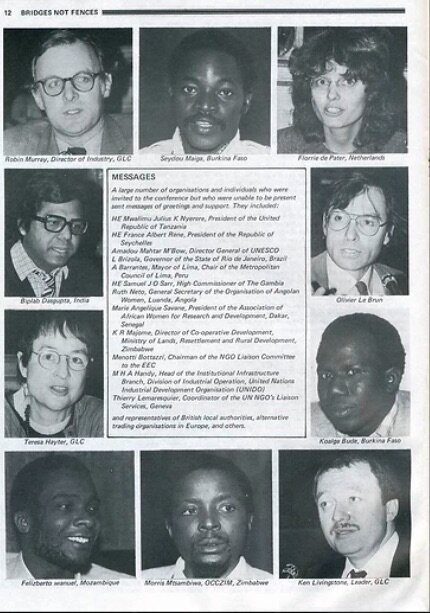Fair Trade
Memorial event to honour Michael Barratt Brown, Fair Trade pioneers, staff and colleagues, London, 2015
The Rise and Rise of Fair Trade by Robin Murray
In his article on ‘Global Civil Society and the Rise of the Civil Economy’, Robin charts the rise of fair trade in the 1980s as a counterpoint to neoliberalism. And, whilst the movement has faced challenges in terms of co-option from large corporates and dilution of the fair trade mark, the idea remains as strong as ever. Indeed, its extension into the mainstream market is a mark of its success. It has delivered economic benefits to producers, enhanced the power of co-operative organisations and stimulated questions about the conditions of production.
The founding of TWIN and Twin Trading, 1984
Olivier Le Brun recounts the early history of TWIN and Twin Trading, the first UK based fair trade organisations. These organisations started out as projects inside the Greater London Council, aimed initially at encouraging new kinds of partnerships between developing countries and the GLC. A few early initiatives - mostly to do with technology transfer - in Vietnam, Eritrea, Peru and Cabo Verde as part of the GLC’s “Third World Project” demonstrated the need for a new organisation to forge direct links between producers and consumers. Inspired by these projects and the work of Dutch fair trade organisation Stichting Ideele Import, TWIN and Twin Trading were established in 1985 to import from progressive economic organisations in Europe and developing countries, provide consultancy services and organise new forms of technology transfer.
Farmer leaders in Bushenyi Uganda with Albert Tucker of TWIN ( L-R) 1990s
Formation and Fair Trade
Albert Tucker reflects on the idea of ‘formation’ - a more holistic approach to training and development than is conveyed by either of those two words alone. Robin, like Michael Barratt-Brown had always hoped to draw on the experience and methodology of two key institutions, Mondragon in the Basque Country and the Northern College, which Michael played a central role in establishing, as the means of driving and assuring gold standard approaches to Fair Trade. While no physical college has been created, Albert discusses the various ways in which new approaches to formation - such as mutual learning and leadership learning exchanges - were adopted by Twin/Twin Trading to ‘form’ the current and next generation of fair trade actors.
Rachel Wallace (centre) TWIN Conference, Toynbee Hall, London, with Ian Barney, Merlin Preza, Richard Hide, Sally Smith, Robin Murray (L-R), 2003
Identity, Principles & Mission: ‘Forming’ Producer Owned Brands
Rachel Wallace reflects on her time working at Twin and Twin Trading with Robin. She argues that the fair trade movement should have more confidence in its experiences and successes to date. It ought to reflect on what is distinctive about the social economy approach and use this insight as a basis for stronger, multi-stakeholder collaborations. Respecting communities and the environment must be integral to the economy, not simply an add-on after financial gain.




